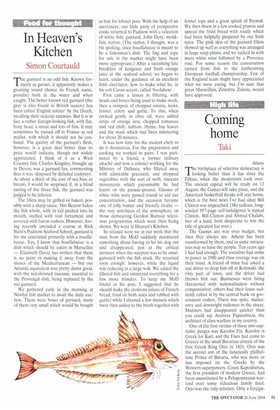In Heaven's Kitchen
Simon Courtauld
Thegurnard is an odd fish. Known formerly as gurnet, it apparently makes a grunting sound (hence its French name, grondin) both in the water and when caught. The better known red gurnard (the grey is also found in British waters) has been called 'English soldier' by the Dutch, recalling their redcoat enemies. But it is in fact a rather foreign-looking fish, with flat, bony head, a snout and lots of fins. It may sometimes be passed off in France as red mullet, with which it should not be confused. The quality of the gurnard's flesh, however, is a great deal better than its price would indicate, though not widely appreciated. I think of it as a West Country fish: Charles Kingsley, brought up in Devon, was a gurnard fan, commenting that it was 'despised by deluded cockneys'. At about a third of the cost of sea bass or bream, I would be surprised if, in a blind tasting of the three fish, the gurnard was judged to be inferior.
The fillets may be grilled or baked, possibly with a sharp sauce. Mrs Beeton bakes the fish whole, with its tail pushed into its mouth, stuffed with veal forcemeat and covered with bacon rashers. However, having recently attended a course at Rick Stein's Padstow Seafood School, gurnard is for me associated primarily with a bouillabaisse. Yes, I know that bouillabaisse is a dish which should be eaten in Marseilles — Elizabeth David has written that there is no point in making it away from the shores of the Mediterranean — but our Atlantic equivalent was pretty damn good, with the red-skinned rascasse, essential to the Provençal dish, being replaced by the red gurnard.
We gathered early in the morning at Newlyn fish market to await the daily auction. There were boxes of gurnard, many of them very small which would be bought as bait for lobster pots. With the help of an auctioneer, our little party of prospective cooks returned to Padstow with a selection of white fish: gurnard. John Dory, monkfish, turbot. (The turbot, I thought, was a bit spoiling, since bouillabaisse is meant to be a fisherman's dish. The ling and tope for sale in the market might have been more appropriate.) After a sustaining late breakfast of kedgeree and fresh orange juice at the seafood school, we began to learn, under the guidance of an excellent Irish chef/tutor, how to make what he, in his soft Cavan accent, called 'boolabess'.
First came a lesson in filleting, with heads and bones being used to make stock, then a mirepoix of chopped onions, leeks, fennel, celery and garlic. To this, when cooked gently in olive oil, were added strips of orange zest, chopped tomatoes and red chilli, saffron, thyme, bay leaves and the stock which had been simmering for about 20 minutes.
It was now time for the student chefs to do it themselves. For the preparation and cooking we worked in pairs. I was partnered by a friend, a former military attaché and now a colonel working for the Ministry of Defence, who filleted away with admirable precision, and chopped vegetables with the sort of swift, staccato movements which presumably he had learnt on the parade-ground. Glasses of white wine were passed round to aid our concentration, and the occasion became one of jolly banter and friendly rivalry — the very antithesis of the atmosphere on those demeaning Gordon Ramsay television programmes which were then being shown. We were in Heaven's Kitchen.
So relaxed were we in our work that the man from the MoD suddenly murmured something about having to let his dog out and disappeared, just at the critical moment when the mirepobr was to be amalgamated with the fish stock. He returned soon enough, however, while the liquid was reducing in a large wok. We added the filleted fish and simmered everything for a few more minutes. To keep my MoD friend at his post, I suggested that he should make the crotitons (slices of French bread, fried on both sides and rubbed with garlic) while I cleaned a few mussels which were then added to the broth together with fennel tops and a good splash of Pernod. We then threw in a few cooked prawns and spread the fried bread with rouille which had been helpfully prepared by our Irish tutor. The pink skin of the gurnard fillets showed up well as everything was arranged in large soup plates, and we tucked in with more white wine followed by a Provence rosé. For some reason the conversation turned from fish to the forthcoming European football championship. Few of the England team might have appreciated what we were eating, but I'm sure that great Marseillais, Zinedine Zidane, would have approved.


































































 Previous page
Previous page